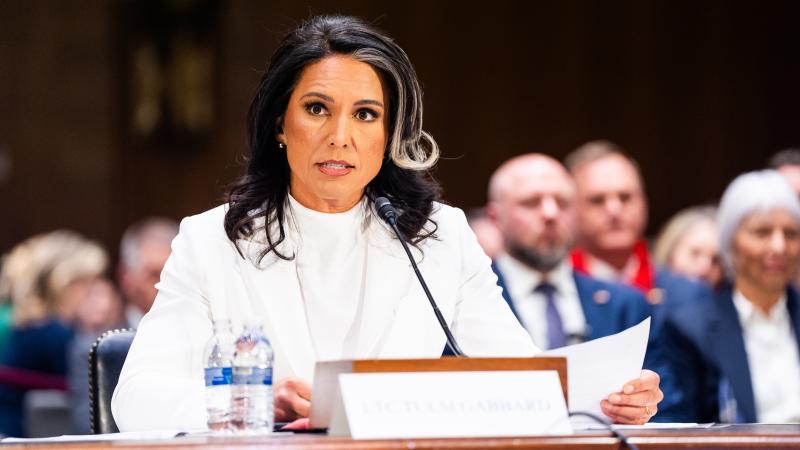Department of Education is stalling complaints against race, sex segregation, critics say
"It's now been 638 days since I filed a simple, straightforward Title IX complaint" against female-only program, professor says.
When the University of Denver hosted race-based gatherings for students, faculty and staff "to process the outcome" of the November election, a student filed a complaint with the Department of Education's Office for Civil Rights.
Christi Collins got a quick response from an enforcement attorney in OCR's Denver office, and they scheduled a phone call. Then the attorney asked to postpone, and disappeared for two months. Their last contact was Feb. 22.
"At this time, OCR is evaluating your complaint, and I apologize for the delay and inconvenience," Lori Welker wrote in the email, one of several communications Collins shared with Just the News. "I will be in touch when we have completed the evaluation."
Two months later, it's still unclear what action, if any, OCR has taken with regard to Collins' complaint. The University of Denver, which is private, told Just the News it has "not been notified of any investigation by OCR or the Department of Education."
OCR Denver office didn't respond to queries. Welker ignored questions from Just the News, saying the Denver query had been forwarded to the D.C. press office.
According to a professor who says he's filed hundreds of civil rights complaints against university programs restricted by race and sex, this is par for the course with the Denver office.
"The Denver OCR is a notoriously bad actor, much worse than any other regional office from my experience (and others)," University of Michigan-Flint economist Mark Perry wrote in an email to Just the News.
The American Enterprise Institute scholar shared his own correspondence with the Denver office and D.C. headquarters all the way through last week, regarding a complaint that's nearly two years old.
"It's now been 638 days (21.3 months or 1.72 years) since I filed a simple, straightforward Title IX complaint vs. the University of Utah on July 17, 2019, for a single, single-sex, female-only program called Hi-Girls Engineering Abilities Realized," Perry wrote to multiple OCR officials April 15.
A Department of Education spokesperson told Just the News April 29 that OCR "cannot comment on open cases." Pressed why it couldn't answer Perry's accusation about its willful refusal to investigate valid complaints, another spokesperson responded May 4 that "there has been no change in the open status of the case."
Regarding the handling of Collins' complaint, filed in the lame-duck Trump administration, Perry doesn't think the switchover to the Biden administration is responsible for its pace.
The resolution of Perry's complaints, which he started filing in earnest in 2018, "seem[s] to be moving at about the same speed" under President Biden, "which is pretty slow," he said.
The professor achieved an unusually fast complaint resolution earlier this week when Michigan State University altered an upcoming conference that was to feature "affinity groups" restricted by race.
It did not intend to discriminate by creating discussion groups for "white folx" and "people of color," the university told The College Fix. (The invitation asked whites and nonwhites to stay out of each other's groups.) Both affinity groups will now be open to all conference participants.
Still evaluating whether to investigate five months later
The Department of Education apparently started receiving so many complaints about sex-restricted programs and scholarships that it added two new "issue codes" early last year.
A former education official in the Trump administration started filing his own complaints once Biden took office.
Race-restricted programs and scholarships don't yet have their own issue codes as such. But affinity spaces, caucuses, orientations, graduations and living arrangements restricted by race have drawn widespread attention in recent years.
The University of Denver's Graduate School of Social Work offered post-election caucuses for black, mixed-race, "people of color" and white students, according to an email Collins shared with the Young America's Foundation (YAF) last fall.
She went back to YAF two months after her last contact with Welker, the enforcement attorney. YAF published OCR Denver's email address April 19: "Let the Department of Education know they will not get away with trying to sweep this racist incident under the rug."
Correspondence shared with Just the News shows that OCR responded to Collins' complaint just four days after she filed it. In a Nov. 10 letter, a staffer estimated it would complete an initial evaluation within 30 days.
Welker emailed Collins Nov. 16 to schedule a phone interview. She told the student Dec. 4 they would talk about "your role at the University and additional information related to the caucus groups," and they scheduled a call for Dec. 9.
Collins told YAF that Welker then postponed the call and didn't respond to her attempts to reschedule. She emailed the attorney Feb. 19 and received a response three days later, disclosing that the initial evaluation was still in progress.
The student told Just the News she didn't recall trying to reach Welker since then: "I have felt so stumped!"
Chronic delay best explained by bad faith
Perry's frustration with OCR's Denver office is palpable in an email chain he shared that goes back to January. The professor told Just the News he had another eight emails from 2020.
"It's now been 544 days since I first filed the complaint and I haven't yet received notification whether this complaint will be opened for an investigation," he wrote to OCR attorney Stephen Chen Jan. 11.
Chen responded the next day that the office had "initiated some investigative actions so that we could review the scope of the complaint and understand the context around it." (Perry regards this response as "classic bureaucratic mumbo jumbo.")
A week later, Perry told Chen that OCR's new "technical assistance" on single-sex programs made his complaint against the University of Utah even stronger.
"I don't think I have ever had a simple evaluation take this long and I've filed almost 300 complaints now" across all 12 regional offices, he wrote. Chen acknowledged the email.
On March 4, Perry told Chen that OCR's San Francisco office had evaluated, investigated and recently resolved a different complaint within a six-month window.
The professor asked for "any explanation of what could cause such an unprecedented delay" at OCR Denver, which now set his personal record for longest wait time. He copied Denver director Aaron Romine and Randolph Wills, the agency's enforcement director.
On April 15, Perry contacted them all again. OCR Denver is violating its legal obligations and may be "acting in bad faith," given the continuing delay, he wrote, asking for a different attorney or different OCR office to take over his complaint.
"I'm not surprised at all by Christi Collins's experience," he told Just the News. Romine has not responded even to direct emails, and Wills has not responded to copied emails, even though the girls-only STEM program is a "valid complaint that meets all the criteria for an investigation."
Perry encouraged students and alumni to first file internal complaints with their own universities, since they are "legally obligated" to evaluate Title VI and Title IX complaints from within the community.















